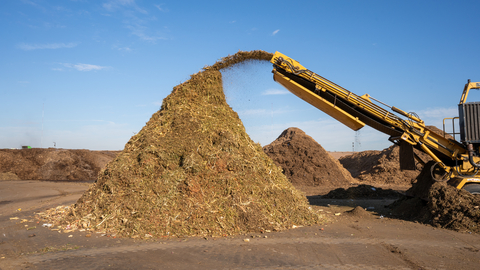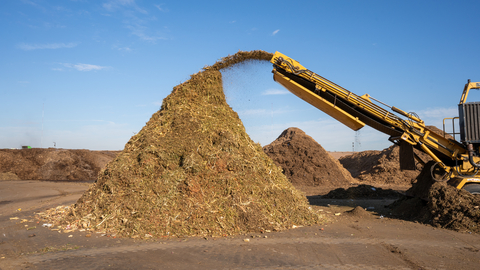RUSSELLVILLE, Ark.--(BUSINESS WIRE)--Denali, the nation’s leading and largest recycler of organic materials, today announced a collaboration with Walmart to roll out innovative depackaging services that can help improve the food waste recycling process at more than a thousand Walmart and Sam's Club locations nationwide. The innovative depackaging technology aims to help drive operational efficiencies for Walmart enterprise associates, and based on early testing, has increased the volume of potentially reusable organic content recovered from participating Walmart and Sam's Club locations by more than 60% and reduced their compactor trash by an estimated 12%. As of today, the program has launched in over 1,400 Walmart and Sam's Club locations in more than 16 markets across the country including Houston, Dallas, Philadelphia, Washington D.C., Indianapolis, Phoenix and cities across New Hampshire, Rhode Island, Massachusetts and Connecticut – with rollout to continue nationwide into 2025.
The depackaging technology and processes separate food from its packaging materials like plastic and cardboard, producing a cleaner stream of organic material that can be turned into animal feed, compost or converted into energy with anaerobic digesters. The depackaging services help avoid the process of manually separating food from its packaging – making it easier to recycle and reuse food waste while freeing up time for retailers. Walmart is one of the first retailers to leverage the newly implemented depackaging capabilities at scale.
For Walmart, this initiative is an example of how the retailer is tackling operational waste through projects aimed at improving the effectiveness and efficiency of its waste management practices, while supporting the company’s sustainability objectives and pursuit of operational waste reduction.
“As a people-led, tech-powered retailer, Walmart is focused on driving innovations that build operational efficiency, improve store associates’ experience, and help reduce waste," said RJ Zanes, Walmart's Vice President of Facility Services. “Denali’s depackaging technology can help enable us to turn millions of pounds of potential food waste into useful products each year while allowing our associates to devote more time serving our customers.”
Denali currently provides depackaging services to thousands of grocers, food manufacturers, distributors and municipalities nationwide by collecting food waste from partners and recycling into valuable products like compost, organic fertilizer, animal feed and clean energy, keeping this resource out of landfills. Denali's network of depackaging facilities can separate up to 97% of all trash from organic food waste, including expired food products, recalled items, food scraps and spoiled deli, bakery and produce. Additionally, the depackaging services can process other food categories including animal products, dry and liquid goods.
“Denali’s depackaging technology is revolutionizing the way in which food manufacturers, distributors, retailers - and the cities in which they operate - can reduce food waste,” said Ilia Kostov, Denali’s Chief Revenue Officer. “We are proud to work with the leading retailer – Walmart and Sam’s Club – to help reduce food waste at scale while simultaneously enabling the circular economy.”
After piloting the program in multiple markets over several years, Denali began its nationwide depackaging services rollout in 2023 in Phoenix, where the City of Phoenix diverted 2,000 tons of food waste generated from events and activities related to the Big Game. Since then, Denali has supported the City of Phoenix and local retailers to process and reduce the amount of food waste reaching landfills.
BY THE NUMBERS
- According to ReFED, the U.S. generated about 77.6 million tons of food waste in 2022 and about 3.9% comes from retailers due to damaged or expired items that are unable to be sold to consumers. Of the food waste generated by retail, 51% went to landfills and 39.5% went to compost or anaerobic digestion. Denali’s depackaging network has the potential to greatly increase the amount of food waste that is recycled through composting and anaerobic digestion, rather than going to the landfill.
- Annually, Denali recycles over 1 billion pounds of food waste into useful products.
- The depackaging machines will enable Denali to recycle 1.5 million pounds of food waste each day for an estimated 500 million pounds of food waste into compost, fertilizer, animal feed and clean energy each year, in partnership with retail and municipality partners (based on 100 tons per store according to Denali).
- Through the city-by-city expansion, each individual business or retail location that starts using the depackaging services, will be able to divert an estimated 200,000 pounds of food waste from landfills.
About Denali
Denali is the leading and largest organic recycling company on a mission to replenish the Earth by repurposing waste. Our work is essential to keeping water clean, reducing the need for new landfill capacity, building soil fertility, helping farmers be more resilient, and reducing society’s reliance on fossil fuels. Our services and products touch thousands of acres, hundreds of locales, millions of tons of material, and nearly every person who purchases and consumes food in the U.S.






